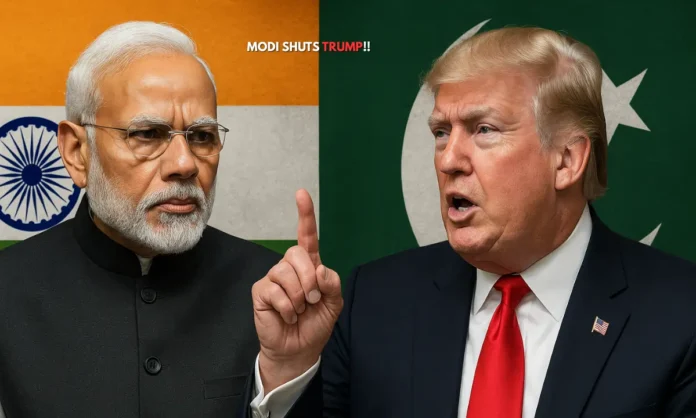SUMMARY
- PM Modi firmly rejected Trump’s claims of brokering the Operation Sindoor ceasefire.
- India reiterated its longstanding policy against third-party mediation on Jammu & Kashmir.
- Modi clarified that Pakistan requested the ceasefire; no trade deal was involved.
Kashmir Isn’t a Bargaining Chip: The Political Blowback of Trump’s Ceasefire Credit
In a rare direct rebuke to a sitting U.S. President, Prime Minister Narendra Modi has clarified India’s uncompromising stance on third-party intervention in Kashmir. This follows Donald Trump’s repeated claims that his mediation efforts — and implied economic pressure — helped broker a ceasefire between India and Pakistan after Operation Sindoor, India’s military retaliation for the Pahalgam terror attack.
The clarification came during a 35-minute phone call between Modi and Trump on Tuesday, June 17, while the Indian PM was attending the G7 Summit in Canada. Foreign Secretary Vikram Misri later addressed the press, underscoring that India “never accepted, and will never accept” mediation from any third party on Jammu & Kashmir. This wasn’t just a routine diplomatic position — it was a sharp response to Trump’s media posturing and narrative-building.
As India faces a complex regional security matrix—bordering a war-ready Iran and a militarily volatile Pakistan—the statement signals Delhi’s intent to maintain sovereign agency in defining the terms of engagement. With the U.S. now playing an increasingly militarized role in the Middle East, including meetings with Pakistan’s army chief, India appears determined to draw clear diplomatic boundaries.
Arrey oo "Hola hu UbAr" ka Mujahid @Pawankhera, subah subah Backchodi karne se pahle Gaa** dhoke news dekh…
— Left RightLOL (@FlagsAndFights) June 18, 2025
PM Modi told Donald Trump clearly that there were never talks held at any level on the India-America trade deal and mediation between India and Pakistan by America. The… pic.twitter.com/TJucJfsihh
A Diplomatic Flashpoint: Trump’s Claims and Modi’s Rebuttal
- Trump claimed he facilitated the ceasefire after Operation Sindoor.
- India categorically denied any trade deal or mediation played a role.
- PM Modi emphasized Pakistan initiated the ceasefire request.
Donald Trump’s narrative—that his intervention halted Indo-Pak hostilities—was swiftly dismantled by India’s foreign office. Trump’s comments, including his alleged quip “Let’s not trade nukes, let’s trade,” were framed as self-congratulatory and misleading. Modi clarified that the cessation of military action had been at Pakistan’s request, conveyed through military backchannels, and that no trade threats or U.S. arbitration were factors.
What particularly irked Delhi was Trump’s linkage of the ceasefire to ongoing Indo-U.S. trade negotiations. With Foreign Secretary Misri stating plainly that “the India-U.S. trade deal played no part in this episode,” Modi’s administration sought to neutralize any suggestion that India’s national security posture could be influenced by economic leverage.
The incident underscores a broader geopolitical theme: while Trump’s America First diplomacy seeks deal-making optics, India is asserting a strategic autonomy built on military capability and diplomatic clarity.
No Mediation, No Middlemen: India’s Hard Line on Kashmir
- Modi reaffirmed that Kashmir is a bilateral issue, off-limits to outside intervention.
- The stance echoes earlier declarations after the Pahalgam attack.
- There is political unanimity in India regarding this position.
Tuesday’s call was not the first time Modi voiced his uncompromising view on Kashmir. On May 12, in his first national address post-ceasefire, he stated: “If we ever talk to Pakistan, it will be on terror and PoK only.” This sentiment has since become central to India’s messaging — Kashmir, and particularly Pakistan-occupied Kashmir (PoK), is a matter of territorial integrity, not negotiation.
Misri reinforced this position: “PM Modi stressed India has never accepted mediation, and does not accept and will never accept it.” From the ruling BJP to opposition benches, this is one of the rare issues where political consensus holds firm.
This stance also serves as a counter to global narratives emerging amid the Iran-Israel conflict, which could draw in Pakistan due to its shared border with Iran. By drawing a clear red line, India seeks to avoid being lumped into broader geopolitical game-plays or Western narrative engineering.
Strategic Optics: Trump Meets Pak Army Chief Asim Munir
- Trump hosted Pakistan’s Army Chief for a private lunch at the White House.
- India sees this as a mixed message amid rising terror threats from Pakistan.
- External Affairs Minister Jaishankar criticized Munir’s extremist rhetoric.
Further complicating the diplomatic picture is Trump’s engagement with Pakistan’s Army Chief, General Asim Munir, who was scheduled for a high-level lunch at the White House. The timing — right after Modi’s phone call and amid global focus on Iran — sent mixed signals to New Delhi.
Munir, considered the architect of Pakistan’s current military strategy, had made provocative remarks before the Pahalgam attack. India’s External Affairs Minister, S. Jaishankar, condemned his “extreme religious outlook” and its violent consequences. For many in Delhi, the optics of Trump hosting Munir while claiming ceasefire credit further undermines trust in U.S. diplomatic neutrality.
The lunch, held in the White House’s Cabinet Room, is being officially framed as a bilateral military cooperation meeting. But its subtext — occurring against the backdrop of American military repositioning in the Middle East — is far more layered.
Ceasefire Without Credit: India Writes Its Own Narrative
In sum, India is making it clear that it will not cede its narrative sovereignty. By refuting Trump’s claims and highlighting Pakistan’s role in requesting the ceasefire, Modi’s government is sending a message — both to domestic audiences and the international community — that New Delhi will not allow its military operations or territorial stakes to be interpreted through the lens of foreign political theater.
The Kashmir issue has long been a touchstone of Indian diplomacy, and Modi’s firm rejection of any external “deal-making” on the matter represents continuity, not change. Whether in dealing with terror, responding to border provocations, or engaging with foreign powers, India is reinforcing a policy anchored in non-negotiable sovereignty and bilateralism.


